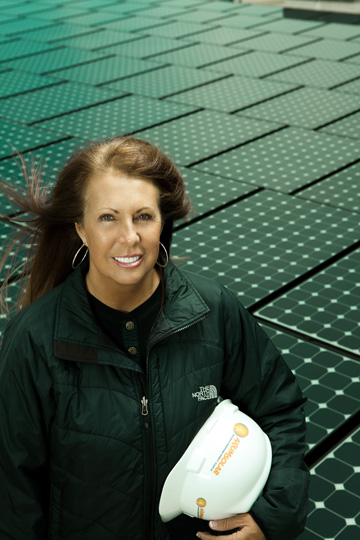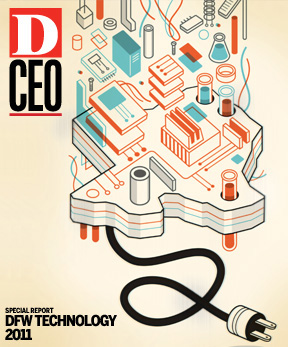When David Welch co-founded Optisense Network Inc. nine years ago, he knew the road ahead would be winding. His future utility customers wouldn’t take kindly to seat-of-the-pants ideas without proven results.
Ten patents later, millions of dollars of investments and years of trials with prospects such as TXU and Alabama Power are finally paying off. Optisense, based in Bridgeport, about 50 miles northwest of Fort Worth, has developed an “optical voltage and current sensor like no one else in this world,” Welch says. The company’s intelligent grid technology now has the backing of a venture capital firm and is ready for production in early 2011.
The sensors, which promise to deliver grid efficiencies, reduced capital expenditures, and safer technology, are in sync as the country prepares to upgrade its electrical grid.
No one says being an emerging energy company would be easy. Finding early-stage financing for energy and sustainable-related technologies is nearly impossible these days. But for those who can bootstrap their idea to fruition, the payoffs are sizeable.
“We have billion-dollar potential,” says Welch, who plans to double his employee count to 30 this year. “The industry itself is approaching a $100 billion market in 10 years. I just want a little piece of that.”
Jonathan Shapiro, founder and CEO of the Texas Institute in Dallas, serves on a regional committee for the Texas Emerging Technology Fund, an investment fund for technology-based startups. One-third of the 50 North Texas companies waiting to go through the ETF application process are energy-related, he says.
“Most of the venture capital firms are trying to raise their next fund and are not lending to early-stage [companies],” says Shapiro, whose nonprofit research institute helps advance sustainable technology research, development, policy, and workforce training.
Optisense was one of the lucky ones, securing $1.5 million in ETF money in 2007. Solarno, a five-year-old company founded by researchers at The University of Texas at Dallas, also has received funding, as has four-year-old Richardson-based 21-Century Silicon.
Plano-based Axium Solar, founded by Yvonne and Bob Kendrick, took a different approach. After 20 years of running Axium Electric, which specializes in energy management and building automation systems, they launched the sister company two years ago. Axium Solar offers installation and custom design of photovoltaic and wind generation systems for residential and commercial buildings.
Revenue for 2010 is expected to hit $6 million; “conservative” sales estimates for 2011 are $14 million. Installations were up 300 percent from 2009 to 2010, says Yvonne Kendrick, president and CEO.
Government subsidies are helping fuel the company’s growth. During the last two years, the company’s projects have shifted to larger municipal, government, and school-related projects because of federal stimulus funds and grants issued by the State Energy Conservation Office, Kendrick says. Clients include the cities of Bedford, Plano, Duncanville, and Grand Prairie; as well as Southern Methodist University and the Internal Revenue Service.
SECO grants require all materials are American made, which is wholeheartedly supported by Axium Solar, but the U.S. supply chain is limited and is slowing the installation process, Kendrick says. “The demand is real, which is even more reason for the U.S. to get on the bandwagon and promote renewable energy and job growth in an industry that has far outgrown our own capacity of supply,” she says.
Some commercial clients, such as Cisco Systems, which installed a 100-kilowatt solar system at its new Allen building, are pursuing the upgrades without any government incentives.
Global companies such as Richardson-based Texas Instruments also are responding to the demand for energy-efficient products and appliances. Production of electric motors is approaching 10 billion units a year, and TI is designing semiconductor chips that make them more efficient, says Mark Denissen, vice president of worldwide strategic marketing.
“It’s an enormous market,” he says. “Appliances are part of that story. The opportunity to make those appliances more intelligent, make them able to communicate, make them able to use just the right amount of water, just the right amount of detergent; all that is an enormous opportunity.”
Shapiro of the Texas Institute is a big proponent of technologies with digital controls that can monitor and censor energy usage.
He isn’t on the payroll at Oncor, but has spoken publicly about the company’s $500 million investment in smart meters, which can tell consumers at what time their energy usage is peaking.
“The investment in smart meters, we’ve yet to see the outcome for this,” Shapiro says. “The next five to 10 years we will see the amount of information and data and opportunity for technology that will come out of this.”
Shapiro is overseeing a new energy lab at the University of Texas at Dallas, which brings together technology giants such as TI, Raytheon, Siemens, and Nokia to examine issues such as cyber security for electrical and smart grids and the integration of renewable energies.
“We’re better positioned than any place in the country because of the communications and military contracting backgrounds here,” he says of North Texas. “Getting everyone to work together requires a Super Bowl kind of idea. I hope the lab will be the first step.”






